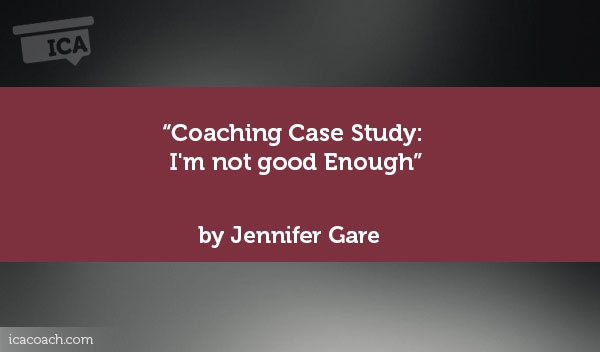
Coaching Case Study By Jennifer Gare
(Transformational coach, CANADA)
Who are the main players in this case study
My client is Shannon a women in her mid forty’s and divorced for 6 years. She was married for 18 years and has two daughters.
What is the core problem or challenge you applied your coaching skills to?
Shannon’s state of being was that she was feeling flawed and not worthy. This core negative belief was stuck on rewind, which constantly made her feel “not good enough” and “invisible.”
The problem was that Shannon know longer trusted or knew herself. She also found herself struggling with accepting any compliments and acknowledgements in her life
This core negative belief has been replaying throughout most of her marriage and the past 6 years.
One of the worst things about problem is that Shannon has “dialed herself down”, “staying small”, and being afraid to align herself to whom she truly is. There is fear that she may not recognize herself and she may “rock the boat” to those around her.
Shannon was never willing to open up about herself, expose her true feelings to others, as she felt she needed to handle it on her own. She felt uncomfortable to reach out for support, as it looked weak and meant she would have to expose herself. Without some form of support and the opportunity to expand, explore, and reflect in a trusted space, Shannon continued to remain in this mode of being “not good enough.”
What specific coaching skills or approach did you use in this case?
1.) Offering a trusted, safe space
2.) Intrinsic Listening
3.) Powerful Questions
4.) Being Present
5.) Rephrasing
6.) Empathy & Support
Explain your process in detail
I established trust and a very safe, confidential space for Shannon. I then set the foundation by explaining the coaching process. Beginning with that this is her space, she holds the power in this relationship, as her coach, my goal is to inspire her to find her way. I am here to listen, support, help her connect with the answers that she doesn’t even know are inside her, challenge her and I will keep her accountable. I explained to Shannon that I am her non-judgemental partner and she will do most of the talking throughout this process. I also reminded Shannon that if she was ever uncomfortable to answer any questions to say so and if I felt it would be beneficial to refer her to another professional, I would do so.
In offering this safe space and a connection of support with Shannon, it allowed her to feel comfortable to open up in our sessions. With non-judgmental curiosity Shannon began to share more of her thoughts and started to expose herself as she had never done before. By staying present in our sessions, asking powerful questions that I didn’t know the answers to, reflecting back to Shannon and always checking in with her during the session (to make sure we were on track & she was comfortable with the direction), gave her the opportunity to examine herself and to actually view her core negative belief pattern that was replaying within her.
This was a huge awareness for Shannon to actually see her pattern. Her awareness regarding how she had defined herself by her failed marriage, which made her continue to believe her thoughts of “not being good enough” and the shame that came loaded with it. I supported and acknowledged Shannon in this awareness. I sat with Shannon while she sat with it and then accepted it. With curiosity and Shannon’s readiness, I supported her in exploring ways to break free of this negative core belief.
As she continued through her work, I actively listened, continued my support and checked in with Shannon to make sure we were on track with her intentions for the session. Finally , we conclude with some small action steps the Shannon had devised to help herself when she felt that she was falling back into her pattern of feeling unworthy. I would conclude our sessions, with letting her know that I am here to support her and if she ever wanted to share something in-between our sessions, that I was available through email or text.
What were the results of your process? Was your coaching/program effective? Why? Why not?
Shannon trusted the space I created for her, therefore she opened up and expanded herself. I feel we reached a result of awareness for Shannon. This awareness was spoken “out loud and heard” and acknowledged for the first time.
Yes I believe the coaching sessions were effective.
If you could approach this problem again, what would you do differently?
There were some sessions that were used to “vent”, which I think were necessary tho there were some opportunities as her coach that I needed to ask questions that brought the conversation back to the focus, the intention, of the session
What are the top 3 things you learnt from this experience?
1.) How important it is to not get caught up in the story. I learnt that I was able to check in with myself, as I could relate to a lot of her issues, and practice staying present for my client.
2.) I learnt how powerful silence is…..allowing the space of silence for my client.
3.) How precious it is to offer a safe trusted space with support, no judgement and intrinsic listening.